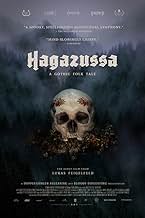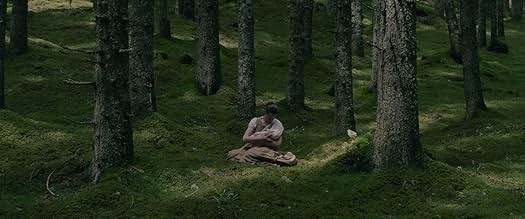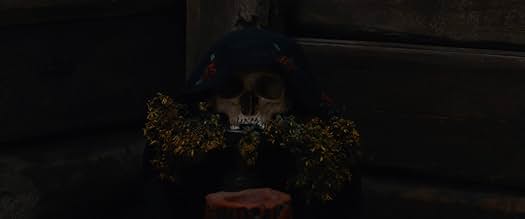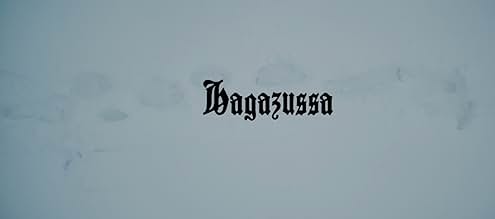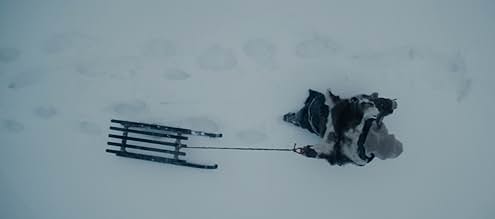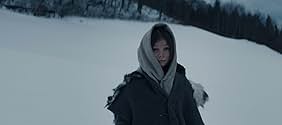After the loss of her tormented mother, the erratic behavior of a 15th century woman living in an isolated mountain village becomes a threat to the safety of her infant child.After the loss of her tormented mother, the erratic behavior of a 15th century woman living in an isolated mountain village becomes a threat to the safety of her infant child.After the loss of her tormented mother, the erratic behavior of a 15th century woman living in an isolated mountain village becomes a threat to the safety of her infant child.
- Awards
- 5 wins & 9 nominations total
Tanja Petrovsky
- Swinda
- (as Tanja Petrovskij)
Killian Abeltshauser
- Farmer
- (as Kilian Abeltshauser)
- Director
- Writer
- All cast & crew
- Production, box office & more at IMDbPro
Featured reviews
This debut and thesis film,"Hagazussa" by Lukas Feigelfeld is an exploration of 15th century European "witch" mythology, rural folklore and superstitions. It's a slow burn but it's visuals and sound mixing are astounding, which is why it has received many nominations and awards since 2017.
His style is yet to evolve, since the film's weak point is telling a story unlike Robert Egger's "The Witch" (2015) does well, inspired by U.S. colonial history. Except for the usages of three title cards to break the narrative, the story gets muddled. After the film viewing, I had seen many confused faces, not understanding what has happened as they left the room.
It's strengths of this emerging director to make the natural looks unnatural. The depictions of a bold performance by Aleksandra Cwen as "Alburn" amongst the Austrian landscape is truly visionary. But again for the general viewers it may not be enough to get into the story.
The film as a story explored moral conflicts amongst the villagers, referring to their persecution of Jews and others outside of the Christian spectrum.
His style is yet to evolve, since the film's weak point is telling a story unlike Robert Egger's "The Witch" (2015) does well, inspired by U.S. colonial history. Except for the usages of three title cards to break the narrative, the story gets muddled. After the film viewing, I had seen many confused faces, not understanding what has happened as they left the room.
It's strengths of this emerging director to make the natural looks unnatural. The depictions of a bold performance by Aleksandra Cwen as "Alburn" amongst the Austrian landscape is truly visionary. But again for the general viewers it may not be enough to get into the story.
The film as a story explored moral conflicts amongst the villagers, referring to their persecution of Jews and others outside of the Christian spectrum.
Folk horror subgenre is close to my heart, and so I finally had to check this German/Austrian nightmare. It's certainly a divisive one. The ever-raging battle of relationship between style and substance among film fans continues here, too, and I seem to land in the middle. I believe director Lukas Feigelfeld, to whom this is film school graduation project, intended a trip. Very gloomy, meditative, earthly trip.
The film contains only a few lines of dialogue. The plot is barely even there, as the movie, in every minute of it, thrives on atmosphere and feelings. The main character doesn't reason much, or scheme, or rationalize, the "plot", or rather mood is driven by mere feelings of hers. Heavy feelings, building an atmosphere that almost tires you. The pacing is much slower than your typical described slow-burner, and the movie demands some sinking into for it to execute its intentions. It's almost like a film equivalent of a gothic painting, a mural that you have to consume with long attention to all detail. The cinematography is beautiful, locations isolated, mossy, almost ancient-like.
A patient man's film, and indeed one for those who appreciate strong on emphasis style, and unspoken moods. On a side note, I had noticed plenty of people put "Hagazussa" against "The VVitch" with the latter coming in second, and with that I, in good conscience, have to disagree. 6/10.
The film contains only a few lines of dialogue. The plot is barely even there, as the movie, in every minute of it, thrives on atmosphere and feelings. The main character doesn't reason much, or scheme, or rationalize, the "plot", or rather mood is driven by mere feelings of hers. Heavy feelings, building an atmosphere that almost tires you. The pacing is much slower than your typical described slow-burner, and the movie demands some sinking into for it to execute its intentions. It's almost like a film equivalent of a gothic painting, a mural that you have to consume with long attention to all detail. The cinematography is beautiful, locations isolated, mossy, almost ancient-like.
A patient man's film, and indeed one for those who appreciate strong on emphasis style, and unspoken moods. On a side note, I had noticed plenty of people put "Hagazussa" against "The VVitch" with the latter coming in second, and with that I, in good conscience, have to disagree. 6/10.
There's barely three pages of dialogue here, so the onus was on visual storytelling and the score, and let me reaffirm, those two aspects didn't disappoint. It's got enough to make you shiver from disgust and horror, particularly in the final moments. There, the tension has built up to a fever pitch. The cinematography and use of lighting also add to the overall eerie atmosphere of the setting, making it quite a riveting experience.
However, the same remarks cannot be applied to its writing, as the narrative left numerous gaps that should have been filled. As the story appeared to lack tangible depth, I felt there was a need to elucidate more on the subject. The story could have been more satisfying if more attention had been paid to further exploration of the legend as well as character development.
Visually, it captivated, but narratively, it underwhelmed.
However, the same remarks cannot be applied to its writing, as the narrative left numerous gaps that should have been filled. As the story appeared to lack tangible depth, I felt there was a need to elucidate more on the subject. The story could have been more satisfying if more attention had been paid to further exploration of the legend as well as character development.
Visually, it captivated, but narratively, it underwhelmed.
About half an hour into the film it gives up to tell a story and becomes a picture album. I've read the film took 4 years to make with a one year brake in-between. Makes you wonder if you have just seen the intermediate state where they took all the filmed material they had so far, strung it together for the sole purpose of achieving a length of circa a 100 minutes and call it a finished movie.
Hagazussa is a film rightly compared to its contemporary in "The Witch" and it undoubtedly suffers for it.
Where The Witch laid out a basic narrative structure and sowed the seeds of malevolence in far more obvious terms, it did not lose its impact or atmosphere during the slower burning scenes. In fact, they served to highlight the ever growing sense of dread - allowing the mind to wander into dark possibilities without ever losing sense of itself.
Hagazussa approaches a similar theme - superstitions, isolation and how misconceptions about the natural world played into daily life during the 16th century, but delivers far less in terms of narrative.
This is more a trip through the life of an outcast Mother & Daughter and we the audience are left to piece together the elements one by one as events unfold.
For me the main question posed by the movie was whether Albrun was indeed going mad or whether she was a witch.
While there is a glaring lack of dialogue that would help to flesh out some of the themes pushed forward (the interactions with Nature, impacts of disease etc) there are enough clues in the imagery to understand that Albrun is undergoing a transformation of some kind, whether it be the loss of her own sanity or something more supernatural.
The presence of the plague and its impact on both Albrun and the local villagers are a catalyst for the films major plot points, as is the intense isolation and persecution of Albrun and its influence over her mental state.
Due to the space in between each element coming together, it is difficult to maintain focus as a viewer and I found myself distracted by my own mind wandering...asking myself if there was something I was missing.
There is a movie worth watching somewhere in here, but it is buried so deep under a pile of long takes and ambiguity, that many will simply look for answers in a different film altogether.
Where The Witch laid out a basic narrative structure and sowed the seeds of malevolence in far more obvious terms, it did not lose its impact or atmosphere during the slower burning scenes. In fact, they served to highlight the ever growing sense of dread - allowing the mind to wander into dark possibilities without ever losing sense of itself.
Hagazussa approaches a similar theme - superstitions, isolation and how misconceptions about the natural world played into daily life during the 16th century, but delivers far less in terms of narrative.
This is more a trip through the life of an outcast Mother & Daughter and we the audience are left to piece together the elements one by one as events unfold.
For me the main question posed by the movie was whether Albrun was indeed going mad or whether she was a witch.
While there is a glaring lack of dialogue that would help to flesh out some of the themes pushed forward (the interactions with Nature, impacts of disease etc) there are enough clues in the imagery to understand that Albrun is undergoing a transformation of some kind, whether it be the loss of her own sanity or something more supernatural.
The presence of the plague and its impact on both Albrun and the local villagers are a catalyst for the films major plot points, as is the intense isolation and persecution of Albrun and its influence over her mental state.
Due to the space in between each element coming together, it is difficult to maintain focus as a viewer and I found myself distracted by my own mind wandering...asking myself if there was something I was missing.
There is a movie worth watching somewhere in here, but it is buried so deep under a pile of long takes and ambiguity, that many will simply look for answers in a different film altogether.
Did you know
- TriviaGraduation film of director Lukas Feigelfeld.
- ConnectionsFeatured in Woodlands Dark and Days Bewitched: A History of Folk Horror (2021)
- How long is Hagazussa?Powered by Alexa
Details
- Release date
- Countries of origin
- Language
- Also known as
- Hagazussa: A Heathen's Curse
- Production companies
- See more company credits at IMDbPro
Box office
- Gross US & Canada
- $13,253
- Opening weekend US & Canada
- $6,041
- Apr 21, 2019
- Gross worldwide
- $21,487
- Runtime
- 1h 42m(102 min)
- Color
- Aspect ratio
- 2.39:1
Contribute to this page
Suggest an edit or add missing content


